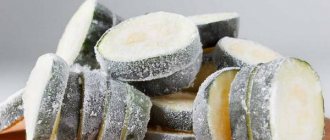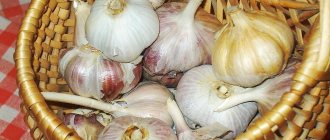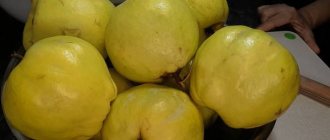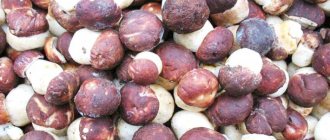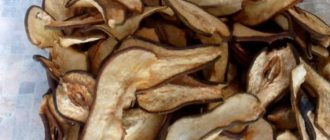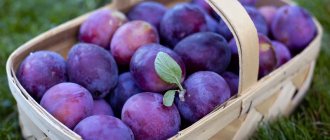Is it possible to store fresh zucchini?
Zucchini is of great interest as a dietary and baby food product. They are perfectly absorbed by the body, do not overload the stomach, and are indicated for people with digestive problems.
Plus, fresh zucchini is very easy to prepare. They are baked, fried, stuffed, and added to soups and salads. Canned vegetables serve as a side dish for dishes in the winter.
To date, breeders have developed 174 varieties of zucchini. The fruits differ in shape, color and taste.
Another characteristic is the fruiting period. Zucchini can be:
- Early ripening. These include the bulk of varieties and hybrids.
- Mid-early. These are Arlica, Aliya, Adrielle, Betsy, Pinocchio, Goodwin, Golda, Donya perfecta, European, Marigold, Excellent Student of Nevira, Sabina.
- Mid-season. These are Caruso, Nice, Spaghetti Raviolo, Spaghetti Femeli, Miracle Orange.
In 2021, a variety recommended by breeders for freezing, Pogrebok, was added to the register.
There are no hybrids or varieties of zucchini for long-term storage on this list. You can store zucchini at home for fresh consumption, but not for long and in small volumes. For the winter, it is better to freeze, dry or preserve them.
- Unripe, juicy fruits with thin skin and small seeds are collected throughout the summer season. They are ideal for preparing rolls and semi-finished products.
- Ripe vegetables are often collected and stored for livestock feed. For culinary use, they have too hard skin, fibrous tasteless pulp and an unpleasant aftertaste.
We answer the question: why does the skin of zucchini turn yellow during storage?
Yellowing of the skin is normal. It indicates the ripening of the vegetable. What’s worse is that the peel becomes thick and tough, and the flesh becomes loose. The taste of the product does not change for the better. Therefore, try not to store fresh vegetables with a reserve; it is better to use other methods.
What varieties of zucchini are best?
In the spring, before sowing zucchini seeds, you need to decide for what purpose the fruits will be grown. Not all varieties have the same shelf life and can be stored for a long time in winter. Vegetables with hard and thick skins, which will reliably protect the delicate inner pulp, are most suitable for this purpose. A distinctive feature of zucchini used for long-term storage in the cellar is the presence of small seeds. The following varieties are best stored:
- Gribovsky. The most common and popular variety, stored for up to six months. The fruit is light green in color and has the shape of a cylinder, expanding towards the base.
- Negro kid. The peel of this variety has a dark green, almost black color and delicate, pleasant-tasting green flesh. The shape of the fruit is cylindrical, shelf life does not exceed 2 months.
- Pear-shaped. The zucchini is a rich orange color with a distinct pear-shaped shape. Ripens early, weighing up to 1.3 kg.
- Aeronaut. An early ripening variety that reaches maturity in 48 days, it is dark green in color and cylindrical in shape. A vegetable weighing up to 1.5 kg can be kept in a basement or cellar for 3-4 months.
- Yellow-fruited. A cylindrical zucchini with a bright, juicy yellow color; the longitudinal ribs are weakly visible on the skin. It has tasty pulp, characterized by a high content of carotene (vitamin A). A vegetable weighing 0.9-1 kg can be stored for about 3 months.
- Arlica. High-yielding variety with soft green skin. Zucchini has a cylindrical, elongated shape and, under good storage conditions, will last until spring, at least 8 months.
- Festival. A spherical fruit, shaped like a pumpkin, with a thick striped white-yellow skin. It is stored for about 8-10 months.
- Asset F1. Dutch selection variety weighing up to 3 kg. The pulp is soft and tasty, there are few seeds. The fruit has a green color and tasty, tender, fleshy pulp. Stored well.
Rules for harvesting vegetables
To prepare zucchini for the winter, you first need to properly harvest them. This will determine how long they will stay in storage.
Collection time for each region is individual. The main thing is to collect the fruits before they fall under the first autumn frosts. But there’s no need to rush into planting – haste will reduce the time you can use zucchini in winter.
To obtain young fruits, zucchini is cut every 2-3 days so as not to interfere with the ripening of the rest. To store them for winter storage, on the contrary, they wait until they are completely ripe, and the new ovaries are torn off.
Harvest in dry weather when nighttime temperatures approach freezing. To keep zucchini fresh in winter, separate them from the vine, leaving a stalk 5 cm long. Use a sharp knife to make a clean and even cut.
Tip of the day
Do not twist the zucchini. An uneven, torn surface of the stalk causes the formation of rot and premature spoilage of the product.
Damaged, diseased and deformed fruits are not suitable for storage. Set them aside immediately and recycle them.
Dry the zucchini selected for storage thoroughly. To do this, leave the fruits under a canopy for 1-2 days. During this time, the cut on the stalk will dry out and become hard, and the juice will no longer be released.
Tip of the day
Do not wash vegetables before storing. Just carefully remove any dried soil from the fruit, being careful not to damage the skin.
Collection and drying
You need to reap the fruits of your labor before the first sub-zero temperatures arrive! Zucchini caught in frost will rot very quickly. Harvesting should be done in dry weather.
The collected zucchini are carefully arranged to “rest” under the morning or evening sun rays, under a fresh breeze. What a pleasant sight it is, just paint a picture!
Next, you need to sort through the vegetables and inspect them for stains or damage, and also choose which ones you decide to store in the winter, and which ones you will enjoy in the near future yourself or treat your neighbors if they are not lucky enough to have a summer house. All zucchini must be carefully cleaned of adhering soil and other debris.
Important: they cannot be washed or wiped with a damp cloth, otherwise storing zucchini in winter will become impossible either at home or even in a cool cellar. Vegetables will spoil much faster!
Storage conditions for zucchini
The keeping quality of zucchini depends on many factors. Under optimal conditions, the product can remain fresh for 4-5 months. This is only possible in a well-equipped and adapted place. But even here, by the end of the period, the vegetable will lose most of its nutritional and taste properties.
During storage, zucchini ripen and may even begin to sprout, so it is better to consume or process all supplies within 2-3 weeks after collection
Under normal room conditions, unripe vegetables last 1-2 weeks, ripe ones - up to 1 month. If you keep them in the refrigerator, you can add another 1-2 weeks.
The following conditions are considered ideal for storing fresh zucchini:
- temperature 5-10 ⁰С;
- humidity 90-95%;
- lack of light;
- good ventilation of the room, but without drafts.
If you have a private home, the best place for storage would be a cellar or basement. There is the most suitable microclimate for vegetables, including fresh zucchini.
You can keep zucchini in a garage, shed or on the veranda, but under one condition. With the onset of severe frosts, the product will have to be moved indoors or the room heated. Even slightly frozen fruits quickly deteriorate and disappear.
Fewer options for where to store zucchini remain in the apartment. Close to ideal conditions can be found on a balcony or loggia, if they are well insulated.
You can also keep the fruits in the room in front of the balcony door, where the air temperature is the lowest. In a pinch, any place under a table or bed will do, but at room temperature the product will stay fresh the least.
We answer the question: is it possible to store zucchini along with potatoes?
There are no special contraindications for this. These vegetables need the same temperature and humidity. Potatoes produce almost no ethylene, which could speed up the ripening of zucchini. If you don’t mind that the latter may become saturated with the potato smell, store them.
Fresh storage methods
There are several simple ways to preserve zucchini before processing. They are more suitable for a private home, but they can also be used in an apartment. Choose which one is right for you.
- On racks or wooden pallets. Vegetables are placed in one row, having previously laid straw, hay or thick paper under them. The fruits are placed so that they do not touch each other.
- In boxes with stems up. In order to protect the fruits from contact, cardboard and fabric are placed between them. You can also wrap each copy in paper, which will further protect the vegetables from an accidental drop in temperature.
- In vegetable nets that are hung on hooks in the cellar. As practice shows, this is a reliable way to preserve fresh zucchini in winter.
Check your bookmark regularly for damage. Dispose of rotten or limp specimens immediately.
You can recognize spoilage in time by a rotten stalk
We answer the question: why do zucchini stored fresh taste bitter?
There are many reasons for bitterness. The main one is that this is a normal spoilage process, since this vegetable is not stored for fresh consumption.
You can get rid of the bitter taste by soaking zucchini cut for cooking in a salty solution (2 tablespoons of salt per 1 liter of water) for 30-40 minutes. However, the taste qualities have already been lost, and you need to try very hard to make a culinary yummy out of such a product.
Zucchini in the refrigerator
Those who are looking for a reliable way to store zucchini in the apartment should definitely use the refrigerator. But in a private house this option will not be superfluous. Modern refrigerators have enough space to store food items for the winter. You can use both the main chamber and the freezer.
In the vegetable compartment
Whole zucchini can last 2-3 weeks in the vegetable compartment. The temperature inside the chamber is ideal, but the humidity is excessive.
Want to preserve your vegetables longer? Wrap them in thick paper or put them in a paper bag with a few holes. This way the vegetable will be protected from excess moisture and will be able to breathe.
We answer the question: what is the best way to store peeled and cut zucchini?
If you have any unused peeled vegetables, wrap them in a plastic bag or damp paper towel. Place the cut pieces into a container with a lid. Store in the refrigerator for no longer than 3 days.
In the freezer
Zucchini can be frozen for the winter. Here are recipes for preparing preparations that will always be on hand in the winter:
- unripe fruits well and dry. Cut into circles 0.5-1 cm thick. Place in bags in portions of several pieces and put in the freezer. Small fruits can also be cut into strips along the entire length of the fruit.
- the mature vegetables into cubes. They must first be peeled and the seeds removed. The sizes of the cubes may vary. Focus on the dishes you will prepare. Place the finished cuts in plastic bags or containers. Store in the freezer.
- For caviar, soups or pancakes, grate the zucchini. Use young fruits whole, and pre-prepare large ripe ones as in the previous recipe. Divide the mass into portions. Store in the freezer in bags or containers.
To preserve the taste of the vegetable as much as possible, you can blanch it before freezing.
You can store vegetables in the freezer for a very long time. In the case of zucchini, you can safely expect that they will be on your table until the new harvest.
Tip of the day
Remove frozen vegetables only just before use. Use without defrosting so that the fruits do not lose their integrity. But be prepared that during the cooking process they will turn into puree. However, this will not affect the taste in any way.
Do not freeze the product twice. This will spoil its taste.
Other storage methods
If the zucchini harvest is large, processing will help preserve it. Young juicy fruits are ideal for canning. More mature vegetables can be dried or dried.
Canning
Every housewife has recipes for making rolls that suit the tastes of the family and do not require much time to prepare. If desired, you can make salted or pickled zucchini. Zucchini jam with the addition of citrus fruits has an excellent taste. Such exoticism makes children very happy.
Many people love and prepare zucchini caviar, combining zucchini with cucumbers, tomatoes, eggplants and other vegetables. Korean-style zucchini and zucchini lecho with bell pepper are also successful. Such rolls not only add variety to the table in winter, but can also serve as a quick snack when you don’t have time to stand at the stove for a long time.
Try making this winter snack using the recipe from the video:
Preservation is very easy. It does not require special conditions. In a private house, a dry cellar, basement or underground is suitable. The apartment has a storage room or a balcony. The workpieces will stand well at room temperature. Their shelf life is 1-2 years.
Transportation
The issue of transporting the harvest disappears for those who live in a private house outside the city and admire the beds full of goodies and vitamins from the window of their own home. If a pile of ripe zucchini needs to be transported along a bumpy road from a summer cottage to urban housing, the “passengers” will have to be taken care of.
As mentioned above, these vegetables, intended for winter stocks, have a strong crust, but this does not guarantee the preservation of their integrity if they are eaten in close quarters or in the company of hard foreign objects with sharp corners. The best option: place the zucchini so that they do not touch each other and are not constrained by any proximity. For this you can use straw or paper; corrugated cardboard is ideal.
